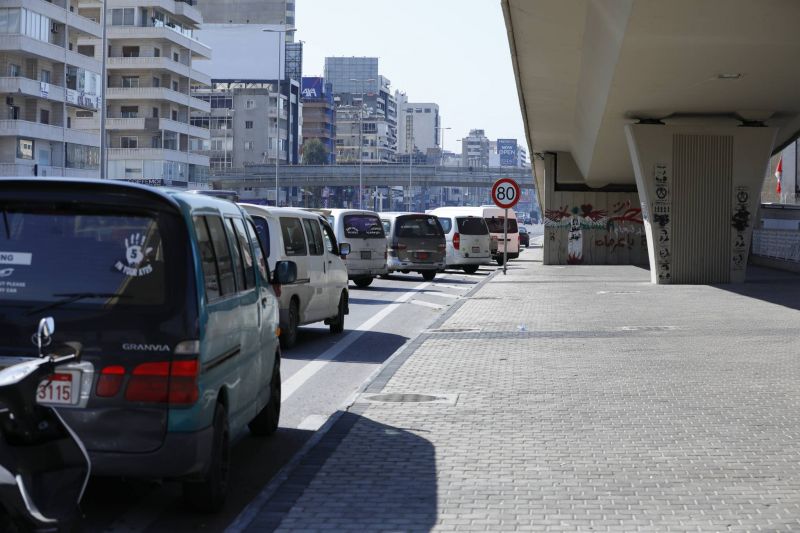
Public transport fares were hiked Wednesday, a day after nationwide protests erupted over increasing economic hardships. (Credit: Marc Fayad)
BEIRUT — Lebanon’s Public Works and Transport Ministry has “temporarily” hiked all public transportation fares by 30 percent Wednesday, piling further economic pressure on the country’s most vulnerable residents.
The increase comes on the heels of nationwide protests Tuesday after the Lebanese lira plunged to a historic low, trading at LL10,000 to the US dollar at midday yesterday, as economic conditions continue to deteriorate.
The cost of a “service” cab ride has risen from LL3,000 to LL4,000 while bus prices increased from LL1,500 to LL2,000 within Beirut, the head of the land transport union Bassam Tleis told L’Orient Today.
A bus ride from Tripoli to Beirut will now cost LL6,000 while a ride from Saida to the capital will cost LL4,000.
This “temporary” price hike will be re-evaluated at the end of the COVID-19 lockdown period, Tleis said. Lebanon’s phased reopening plan forecasts the country’s reopening by the end of March.
With the cost-of-living multiplying and more than half the population living below the poverty line, the rise in taxi fares will “undoubtedly impact people’s ability to get to work and to move around the country, especially given the lack of functioning public transport sector,” Aya Majzoub, a Lebanon researcher at Human Rights Watch, told L’Orient Today.
Caretaker Public Works and Transport Minister Michel Najjar said the hike was due to the limited number of passengers allowed in public transport vehicles during the lockdown, which have been capped at 30 percent capacity to limit the spread of the coronavirus.
Soaring oil prices globally have also been felt in Lebanon, where the price of a tank of 95 octane gasoline has increased 15.1 percent the past month, selling for LL33,500 as of Wednesday.
He also laid the blame at the feet of Lebanon’s rapidly depreciating currency. On Wednesday, the dollar was selling for some LL9,900 according to exchange currency websites.
After a meeting Wednesday with the head of Banque du Liban in Baabda, President Michel Aoun queried Riad Salameh for the reasons behind the lira’s drop, which had been hovering around the LL9,500 mark for the better part of a week.
The president also called for the “prosecution of those involved in illegal speculation against the national currency,” according to a statement issued by his office.
“People have a right to be angry,” Aoun said, labeling Tuesday’s protests as “righteous” while the government formation stalemate enters its fifth month. He and premier-designate Saad Hariri have yet to see eye to eye on the makeup of the government, bickering over the allocation of key ministerial portfolios.
Meanwhile, Hassan Diab’s government continued in a limited capacity this week, while passing the milestone of serving in caretaker mode longer than active status.
Demonstrators continued to vent their frustration Wednesday amid deteriorating living conditions, blocking multiple roads across the country, including in Beirut, outside Baalbeck and in Zahle.
“Living conditions in Lebanon are deteriorating rapidly, and more than half the population is now unable to afford basic necessities. Unemployment is rising rapidly, but even those who are still employed have seen their salaries become worth a fraction of what they used to be,” Majzoub said.
“Yet, politicians are still burying their head in the sand, conducting business as usual, and failing to address the multiple spiraling crises facing the country.”